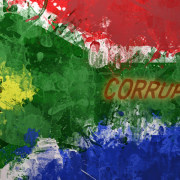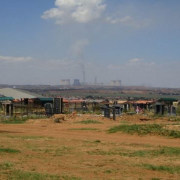|
Getting your Trinity Audio player ready...
|
By Lesedi Masoko
“The existent level of corruption in developing countries across Africa, is high because it is entrenched in its historical roots of colonialism.”
This is the view of scholars Luis Angeles and Kyriakos C. Neanidis, written in their 2014 journal article titled The Persistent Effect of Colonialism on Corruption.
On this Heritage Day 2022, we unpack the notion that the heritage of corruption is one that we, as South Africans, have carried for many decades, even centuries, and that its effects are more catastrophic than ever.
Corruption is not new, and we know it. Corruption has been an ongoing issue in South Africa – and indeed the world – that has grown to become more and more deadly. It has existed throughout history and still remains alive today. Like a ball of snow, once it starts rolling, it becomes bigger, and the bigger it grows, the more problematic its effects become – to the extent that it has entrenched itself deeply in our society, as though it is a culture that runs through our veins.
In South Africa and abroad, corruption continues to be rooted in people in power. One could argue that South Africa has too many chefs in the kitchen, and the final product is suffering as a result because it is difficult to keep track of who’s doing what and who has what degree of control over state resources. Furthermore, it becomes hard to hold leaders accountable.
Colonialism as a driver of corruption
Angeles and Neanidis go on to explore the role of historical socio-political factors that may have a direct impact on corruption in Africa, highlighting the long-term effects of colonialism on factors such as institutional quality, socio-economic development, company law, and the administration of justice.
Other studies find a connection between the colonial rule and the local elites (African chiefs and kings) concerning the development of Africa. The evidence suggests that the British power in Africa may have fostered the corruption of local elites in Africa and consequently undermined the people’s trust in them, argue Merima Ali, Odd-Helge Fjeldstad, and Abdulaziz B. Shifa in their 2020 article titled Did British colonial rule in Africa foster a legacy of corruption among local elites?
For example, with regard to land, chiefs historically exert influence over the allocation of land ownership and the distribution of land rents – even today, this has a significant implication on the land issue in South Africa and on the continent, considering the influence of the agricultural industry and the wealth of natural resources on the economy. As Ali et al note: “The British colonial rule gave greater autonomy to chiefs than they had in precolonial times, which bolstered their power and undermined their accountability to the local population.”
As Corruption Watch’s work with mining communities demonstrates, the accountability of local chiefs is an important source of attention in the equitable issue of the distribution of mining royalties. Chiefs enter into contractual deals with mining companies on behalf of their rural communities, and often face serious allegations of corruption as they benefit at the expense of the community’s resources.
Local chiefs in Africa were also responsible for the control of governance roles that involved administrative factors such as collecting community taxes, provisioning public goods, and facilitating aid projects for their communities.
“These empirical patterns suggest that the empowerment of chiefs under colonial rule has a more potent legacy than the formal legal system that colonisers left behind,” Ali et al conclude. “Our finding of a positive association between British rule and the level of corruption among chiefs underscores an important qualification to the empirical patterns in the existing economics literature on the legacy of British rule on corruption.”
Going back 350 years
However, corruption existed and was practised even before British control, says UJ political studies professor Stephen Friedman, pointing out that Jan van Riebeeck, who arrived in 1652 to colonise the Cape, got the job as a second chance after he was fired for ignoring the Dutch East India Company ban on using his office to pursue personal financial interests.
“In reality, corruption has been a constant feature of South African political life for much of the past 350 years. It is deeply embedded, and it will take a concerted effort, over years, not days, to defeat it.”
This is a widely accepted view. In a 1998 paper titled Political corruption in South Africa, Tom Lodge, former professor of political studies at Wits, says: “Corruption becomes systemic when corrupt activity begins to appear at all levels within a political system and when it becomes repetitious, constituting a parallel set of procedures to those which properly constitute the formal functions of the bureaucracy.”
As an example, when the social grants payments crisis unfolded a few years ago, an investigation was chaired by Judge Bernard Ngoepe into the conduct of then minister of social development Bathabile Dlamini. Specifically, Ngoepe was probing whether Dlamini had personally ordered the appointment of individuals to lead work streams which ran parallel to the South African Social Security Agency’s (Sassa) normal processes but reported directly to her.
Ngoepe’s report found that in 2016, she had done just that. The streams were to implement the fanciful recommendations of an advisory committee that Sassa set up its own in-house grant payment system. While reporting directly to Dlamini, the employees were to be paid from Sassa funds – a move that the National Treasury blocked for around a year. The Treasury later determined that the work streams were irregularly appointed and furthermore, had cost the country nearly R50-million.
Routine and open petty corruption, explains Lodge, usually signifies a “systemic condition of corruption; secretive grand corruption may exist despite the absence of more pervasive bureaucratic misbehaviour.”
The result is that in administrations in which corruption becomes systemic and epidemic, the ever-increasing scale of misappropriation substantially reduces public expenditure on development and services, which means that people are denied the most basic of services.
Apartheid and democracy
In Political corruption in South Africa, Lodge mentions a survey conducted in 1998 about government leadership and corruption, where 55% percent of the population answered that they believed that the majority of civil servants were guilty of having taken bribes.
Furthermore, in its revealing report, Joining the Dots: The Long Shadow of Economic Crime in South Africa, the Open Secrets organisation argues that: “There is a growing recognition among South Africans that contemporary challenges of corruption and state capture are deeply rooted in our history. The white apartheid state was itself captured by private networks that saw opportunity to profit from oppression.”
Open Secrets released the report to coincide with the sitting of the People’s Tribunal on Economic Crime, for which Corruption Watch was part of the organising committee. The tribunal panel found that in the three specific eras of South African history that were under scrutiny, there was enough evidence to warrant a thorough investigation into economic crimes both past and present. The three periods were apartheid, the arms deal, and present-day state capture.
Friedman backs this contention up: “The most corrupt period in the country’s history was the last few years of apartheid, when the attempt to combat the successful international sanctions campaign made corruption, protected by government secrecy, the core government strategy. This was often done with the collusion of private businesses.”
In today’s climate of corruption, the biggest losers are the millions of ordinary people who are denied the basic services provided to them by the Constitution – because many of those sitting pretty at the top have lost touch with the needs of the general population. So much of the money and resources provided for development is diverted to personal accounts, while citizens are without homes, without jobs, and without a future.
In 2011, former Special Investigating Unit head Willie Hofmeyr reported to Parliament that between R25-billion and R30-billion was lost from the government procurement budget each year as a result of fraud. In many cases, this loss was, and continues to be, masterminded by the country’s top leadership.
Former president Jacob Zuma, who took presidency in the year 2009, has been implicated in numerous criminal acts that reflect corruption. In their 2017 journal article titled The End of the ANC Era: An Analysis of Corruption and Inequality in South Africa, Olivia Lannegren and Hiroshi Ito note that Zuma had been connected to corruption scandals that date back to 1995.
In 2008, Zuma was charged with money laundering, racketeering, and fraud in relation to his alleged complicity in bribery relating to the arms deal. Much time has since elapsed and because of delays and postponements, the case has not yet come to trial – 14 years later. Zuma also knowingly used public money to upgrade his luxury private residence in Nkandla, KwaZulu-Natal. In March 2016 the Constitutional Court ruled that he had failed to uphold the Constitution in his gratuitous use of public funds, and ordered him to pay back the millions – which he eventually did.
But it is for Zuma’s involvement with the wealthy Gupta family during the era of state capture, however, that history will remember him.
Lack of accountability and failure to impose consequences on the perpetrators of corruption has helped to cripple South Africa and its economy. Every year in its provincial and municipal audit reports, the Auditor-General of South Africa condemns the millions lost to incompetence, poor governance, irregular and unauthorised expenditure, and corruption. And while those responsible suffer no inconvenience, the ordinary person in the street has to live with the grim heritage.
Transformation approaches
The anti-corruption fight goes on around the world, through varying approaches, initiatives and campaigns. One of the most crucial requirements for success is transparency. Another is access to information.
Transformative factors such as education and information sharing can impact the fight against corruption greatly, says Reporters Without Borders Secretary-General Christophe Deloire.
It is important that people get access to the right information in order for them to know how to identify the unethical and unlawful acts around them and know what to do next. Transparency and information sharing in all areas of governance – both private and public – will allow the public to make the right political decisions on an informed basis. This is their constitutional right.
Corruption has to be fought from the top to the bottom because if the powerful elite are not held accountable, then the culture will continue and everyone else will fall into the trap. Leaders both in the public and private sectors have to be held accountable for their actions and must be dealt with accordingly for their crimes.
Perhaps setting an example with the current leadership may influence a change in behaviour and conduct for everyone else, and break the cycle of corruption which South Africa grapples with today.








